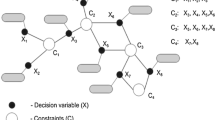Abstract
Post-Model Analysis (PMA) is a framework that unifies an optimization model with a rule-based system and enables the multi-objective decision modeling that considers both numeric and symbolic objectives and decision variables. In this research, we have developed a system UNIK-PMA that implements the PMA procedure on the knowledge-assisted optimization modeler UNIK-OPT and a backward chaining rule-based system UNIK-BWD. This paper particularly elaborates the process of generating constraints of the linear programming model from the rule-based goals, which is a crucial step of PMA. UNIK-PMA is illustrated with an example of aggregate production planning.
Similar content being viewed by others
References
K.J. Hammond, Planning and goal interaction: The use of past solutions in present situations,Proceedings of the National Annual Conference on Artificial Intelligence, 1983, pp. 148–151.
M. Klein and L.B. Methlie,Expert Systems: A Decision Support Approach with Applications in Management and Finance, Addison-Wesley, 1990.
R. Krishnan, A logic modeling language for automated model construction, Decision Support Systems 6, 1990, 123–152.
R. Krishnan, PDM: A knowledge-based tool for model construction, Decision Support Systems 7, 1991, 301–314.
J.K. Lee, Solving semi-structured problems and the design of decision support systems: Post-model analysis approach, Doctoral Dissertation, Department of Decision Sciences, The Wharton School, University of Pennsylvania, Philadelphia, 1985.
J.K. Lee, (ed.), Unified Programming, forthcoming special issue of Decision Support Systems, (1996).
J.K. Lee et al., Development of UNIK for the integration of knowledge and optimization models and its application to petroleum industry (in Korean), Technical Report N486-3509-7, Korea Advanced Institute of Science and Technology, Seoul, Korea, 1989.
J.K. Lee, S.C. Chu, S.H. Shim and M.Y. Kim, A knowledge-based formulation of linear programming models using UNIK-OPT,2nd International Workshop in Artificial Intelligence on Economics and Management, North-Holland, 1989.
J.K. Lee and E.G. Hurst, Multiple criteria decision making including qualitative factors: The post-model analysis approach, Decision Sciences 19, 1988, 334–352.
J.K. Lee and B.S. Kang, Intelligent production planning system using the post-model analysis approach, in:Applied Expert System, E. Turban and P. R. Watkins, eds., North-Holland, 1988, pp. 87–106.
J.K. Lee and M.Y. Kim, Knowledge-assisted optimization model formulation: UNIK-OPT, Decision Support Systems 13, 1995, 111–132.
J.K. Lee, W. Kim and M. Y. Kim, Neural network surrogate of the optimization model's adaptive sensitivity analysis: A refinery case, KAIST MIS Working Paper, 1995.
J.K. Lee and W. Kim, UNIK-OPT/NN: Neural network based adaptive optimal controller on the optimization models, forthcoming in Decision Support Systems (1996).
J.K. Lee and S.B. Kwon, ES*: An expert systems development planner using a constraint and rule-based approach, Expert Systems with Applications 9, 1995, 3–14.
J.K. Lee and H.G. Lee, Interaction of strategic planning and short-term planning: An intelligent DSS by the post-model analysis approach, Decision Support Systems 3, 1987, 141–154.
J.K. Lee and Y.U. Song, Unification of linear programming with a rule-based system by the post-model analysis approach, Management Science 41, 1995, 835–847.
F.H. Murphy, E.A. Stohr and P. Ma, Composition rules for building linear programming models from component models, Management Science 38, 1992, 948–963.
K. Yeom and J.K. Lee, High level representation of integer programming models: UNIK-IP, forth-coming in Decision Support Systems (1996).
Author information
Authors and Affiliations
Rights and permissions
About this article
Cite this article
Lee, J.K., Song, Y.U. UNIK-PMA: A unifier of optimization model with rule-based systems by the post-model analysis. Ann Oper Res 65, 157–179 (1996). https://doi.org/10.1007/BF02187330
Issue Date:
DOI: https://doi.org/10.1007/BF02187330




